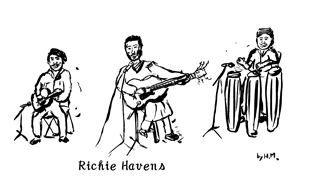

If you look up 'folk' music in an ordinary Japanese dictionary, you can find in it the word like 'traditional' or 'common'. In Japan the general meaning of 'folk' is, it seems to me, not a traditional term but the music which had been influenced by the folk revival of the late 50s and early 60s' the U.S., where they gain wider explanations. In the 4-CD box set "American Roots Music" which covers various kinds of music, there are tunes of famous white folk singers such as Woody Guthrie, the Weavers featuring Pete Seegar or Peter, Paul & Mary. Folk music had been so flexible that they not only wrote and sang their own songs but also sang others' tunes or traditional ones with changed lyrics and, moreover, had inspirations from the blues or gospel. However, since the companies which released folk music and the singers gathered in big cities, folk music has gradually settled in "music for the urban intelligentsia". Meanwhile, since the earlier years folk music had black singers, who appears on the album I have mentioned or "Say It Loud ! " which tells the history of the blacks with music. Before the World War II there was Leadbelly who left blues-tinged folk recordings with the help of the white scientific researches, and there was Odetta, a female singer in the New York folk scene of the 50s and 60s. In recent years I recall the name Tracy Chapman. Despite it, it seems to me that folk music put stress on acoustic guitar and statements stubbornly. I feel like thinking that this is proven by the accident that Bob Dylan came in for criticisms when he had an electric guitar in his hands.(On the DVD "The Other Side of the Mirror ", the accident appears on the movie of the Newport Folk Festival in '65)
Richie Havens was born in the Brooklyn area of New York and was said to have enjoyed various kinds of music including doo-wap or gospel. Among them he was most interested in beatnik's free-style lyrics-making, and then he was influenced by the folk revival of the early 60s, moved into Greenwich Village, 'the Holy Land' of the New York folk scene, and made many performances at the clubs. Since the latter 60s he made some recordings from Verve/Folkways, an affiliate of the corporate MGM. He is well known by his style of guitar playing with open E tuning (it rings Mi, Sol sharp and Si if you don't touch any fret), pressing the frets with his thumb, strumming guitar like the percussions and singing like growling, which is hardly found in folk music. In his masterpiece "Mixed Bag" you can hear idiosyncratic rhythms of High Flyin' Bird or Handsome Johnny swayed by his feelings which pour into the songs. You can find the difference between it and the folk rock which has songs riding on delicate performances and rhythms. You may feel monotony if you only hear such tunes, however, you can find it rather colorful when you touch gentle backings of Follow or San Francisco Bay Blues and the readings of Bob Dylan and the Beatles.
No matter how one may say, the brightest spotlight in which Richie Havens bathed himself was Woodstock. As lengthy movies are likely to be impressed by those who appear at first more than ones in the middle, when I saw a part of the Woodstock motion picture I most remembered Richie Havens, who sat on the chair and played aggressively with making some tunings and stamping his foot. On the Japanese edition of the soundtrack "Woodstock" the feature is Freedom partly citing gospel tune Sometimes I Feel Like a Motherless Child, which makes me feel crazy by the way he presses all of things with a keyword 'freedom', rather than the meaning of lyrics. When I see the names of the performers at Woodstock, I find the list seemed to be made mainly by the folk people in Greenwich Village including Joan Baez and the corporate labels. I make some considerations when I compare Woodstock with Monterey International Pop Festival, which held before Woodstock and had artists like Otis Redding of the soul or Ravi Shankar of India (you know he is the father of Norah Jones) (the DVD "The Director's Cut Woodstock", is a documentary movie about "Woodstock syndrome" rather than a music movie, however, its performances between documentaries are finally fabulous).
Thanks to the benefit of film-starring, Richie Havens made some hits but he gradually made less song-writings and did more live-performings. His Verve/Folkways best "The Best of Richie Havens" gives you his signature guitar-banging tunes like No Opportunity Necessary, No Experience Needed or The Klan and more. On his "Resume", the best including his own Stormy Forest recordings in the early '70s, you can find his unique rendition and his biggest hit ever Here Comes the Sun , which shows folk music had not already been the music of one guitar. Many have kept making renditions of the Beatles and Bob Dylan because of the charm of lyrics. Richie Havens is relatively true to the melodies of such songs and delivers not so skillful but appealing deep-voices. His release in '87 of the apparent title, Sings Beatles and Dylan", has the inevitable sound of snares in the '80s on the one hand, and on the other his significant readings, which also let me understand that Bob Dylan was so great, not to mention the Beatles. (2006/02/19)(2008/04/08)